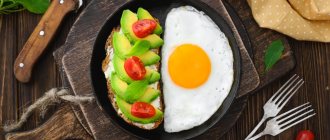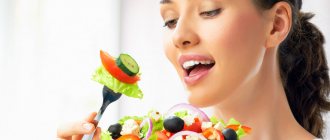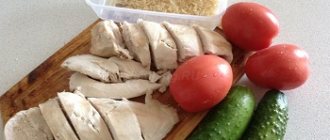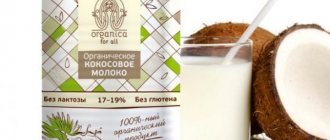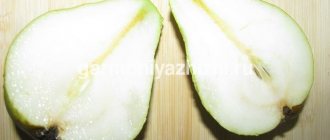We can say that vegetarian nutrition is built on the basis of several interrelated principles: refusal to eat meat, a diet consisting mostly of plant-based products, condemnation of the killing of animals, and the desire to consume healthy and nutritious foods that bring the greatest benefit to the body.
And a kind of central place in the coordinate system defined by these ideas belongs to lacto-ovo vegetarianism. Which, on the one hand, does not require killing animals for food, and provides a large selection of products to create a diet that allows you to cover all the body’s needs, including vitamins and microelements, on the other. “Lacto” means milk, “ovo” means eggs, and all together - a vegetarian-type food system, which, in addition to plant foods, includes eggs and dairy products, respectively.
What do lacto ovo vegetarians eat?
Here is a slightly more detailed list of what is included in the menu that offers lacto ovo vegetarianism to its followers. Part of this list is typical for almost all types of vegetarianism; there is also something on this menu that is not suitable for all vegetarians. So, what is not given up in stricter forms of vegetarianism (veganism, for example) is:
- fruits, in any form, including juices and dried fruits;
- vegetables, various vegetable dishes;
- legumes, grain products, various cereals and cereals;
- nuts and seeds.
Let us note here that lacto-ovo vegetarianism does not imply any restrictions on methods of preparing “allowed” products . They can be boiled, fried, baked, salted, preserved in other ways and, of course, eaten raw. Further:
- honey, vegetable oils, mushrooms; Lacto-ovo vegetarianism does not in any way regulate, prohibit, or “prescribe” these products for consumption, like the following two types of products;
- dairy products - milk, butter, cottage cheese, cheeses, yogurt, sour cream, fermented milk products;
- eggs, 1-2 eggs per day is considered the norm in this food system.
What foods should you include in your diet?
A healthy lacto-vegetarian diet should include a variety of plant foods and dairy products.
Here are some foods you can try as part of a lacto-vegetarian diet:
- Fruits : apples, oranges, berries, melons, peaches, pears, bananas
- Vegetables : broccoli, cauliflower, kale, spinach, peppers, arugula
- Legumes : lentils, beans, peas, chickpeas
- Healthy fats : avocado, coconut oil, olive oil
- Whole grains : barley, buckwheat, quinoa, oats, rice, amaranth
- Dairy products : milk, yogurt, cheese, butter
- Protein products : tofu, tempeh, nutritional yeast, whey, vegetarian protein powder
- Nuts : almonds, walnuts, pistachios, Brazil nuts, hazelnuts, nut butters
- Seeds : chia, flax, hemp, pumpkin and sunflower
- Herbs and spices : cumin, turmeric, basil, oregano, rosemary, pepper, thyme
Summary:
Lacto-vegetarianism can include a variety of foods, including fruits, vegetables, whole grains, healthy fats, dairy and protein-rich foods.
Lacto-ovo vegetarianism in the debate about the dangers and benefits of vegetarianism
The main argument put forward by supporters of meat-eating is that only meat contains the entire necessary complex of proteins, fats, carbohydrates, vitamins and microelements necessary for the growth and normal functioning of the body; Vegetarians don't get enough of it. First of all, we are talking about vitamins D and B12, some amino acids, as well as calcium. In this regard, lacto ovo vegetarians have an easier time than stricter vegetarians. Eggs are a recognized “supplier” of easily digestible, complete protein, including the entire complete set of essential amino acids . Eggs also contain a lot of vitamins, including the notorious B12.
But we must remember that they, as well as the calcium contained in eggs, are less absorbed than when eating, for example, plant foods. But dairy products help saturate the body with calcium, vitamins D, B12, and again, amino acids. And to ensure a normal level of iron in the body, there are, for example, dried fruits. That is, lacto ovo vegetarians do not suffer from nutritional deficiencies. But a deficiency of animal protein can lead to the consumption of sweets and flour products; you need to carefully monitor the balance of your diet.
Harm
Food of animal origin contains a number of vitamins and microelements that are not found in plant foods at all. By excluding the animal component from the diet, a person deprives himself of these beneficial substances, which ultimately threatens the body with metabolic disorders.
Here are the beneficial substances we are talking about:
- Such an important trace element as iron. Its presence affects the composition of the blood. Most of this microelement is found in offal, such as liver, kidneys, and fish. Vegetarians insist that iron is also present in plant foods. But the problem is that, along with iron, plant foods contain substances that prevent the full absorption of this element. It is easier and more abundant for the body to absorb this element from food of animal origin.
- Anyone who plays sports even a little knows that protein is simply indispensable for building muscle tissue. Vegetarians insist that this element can be extracted by eating legumes. Here things are the same as with iron. Indeed, plant foods contain protein, but the human body only absorbs half of it. Unlike animal protein, which is completely absorbed.
- The next important microelement is calcium. It is extremely important for the health of the musculoskeletal system, as well as for the beauty of hair and nails. The opinion of vegetarians is that this microelement can be more than obtained from leafy vegetables. But! Current research suggests that the amount of calcium in the body of vegetarians is often greatly reduced.
- Animal foods contain the important vitamin B12. The normal functioning of the nervous system depends on the presence of this vitamin. Plant foods are not able to saturate the human body with this vitamin.
Benefits and variety of dairy products
Along with nutritional value, dairy products have a number of beneficial properties. It’s not without reason that milk is given to workers in “harmful” industries – it helps neutralize toxic substances and radiation. When excluding meat from the diet, it will be necessary to pay attention to a sufficient amount of fat in the diet. Their supply can be provided by products with a high content of milk fats: butter, sour cream, cottage cheese with a high percentage of fat content; along with vegetable oils and other fat-containing plant products, such as avocados. Fermented milk products, primarily kefir, as well as yoghurts containing special cultures, have a beneficial effect on the intestinal microflora. And the list goes on.
But those whose diet has not included milk for a long time need to make sure that they are not allergic to milk protein and that the body digests milk protein well in all forms. To be fair, let us mention that some consider milk in general to be almost a poison, a product that is certainly harmful to the body. But the millennia of existence of, for example, the Vedic culture, in which lacto vegetarianism has an equally ancient history, shows the excessive severity of this opinion.
How to start lacto-vegetarianism
Since the transition to lacto-vegetarianism is smoother and gentler, many people stop there: dairy products in moderate doses do not have such a severe effect as meat or fish dishes.
First of all, when switching to a new diet, you should give up meat products:
- sausages,
- sausages,
- meat,
- cutlets
Moreover, this transition can be made in two steps: first, exclude from the diet all products containing pork or meat of unknown origin, leaving only chicken and poultry products, and then, after a week or two, gradually eliminate their consumption, as well. gradually introducing more cereals, herbs, vegetables and fruits.
Non-vegetarian dairy products
It may seem strange, but not all dairy products are suitable for a vegetarian table, and this applies not only to recipes like “boil meat in milk...”. In the production of most cheeses and some types of cottage cheese, rennet (renin) is used, usually obtained from the stomachs of young calves. But rennet of microbial or microbacterial origin is also used. Ideally, this should be indicated on the packaging.
Gelatin is also mostly of animal origin; to obtain it, animal bones, tendons and cartilage are boiled. Gelatin is often used in making ice cream and other dairy desserts, as well as some types of sour cream and yogurt. But there are also gelatins of plant origin - pectin, agar-agar and others. (By the way, carob fruits are considered the best gelling agent for confectionery products). In general, lacto vegetarianism in modern conditions requires careful study of what is written on the packaging of dairy products.
Ovo-vegetarianism
Another type of relatively democratic type of vegetarian diet is ovo-vegetarianism. An ovo-vegetarian diet requires no dairy products, but you can eat eggs.
If we talk about the reasons why people begin to adhere to an ovo-vegetarian diet, then they are either ethical in nature, or individual intolerance to dairy products is the basis of ovo-vegetarianism.
Another advantage of an ovo-vegetarian diet is that it allows you to eat a product that is beneficial to the body, such as honey.
An ovo-vegetarian diet can even be prescribed for people with poor health. The ovo-vegetarian diet is easy to eat and is good for colds and other body ailments.
Medical indications for lacto-ovo vegetarianism
One of the important reasons for switching to a vegetarian diet is the belief in the beneficial effects of the latter on health. And in the case of lacto-ovo vegetarianism, this can be considered the most proven. There are a number of medical indications for the use of appropriate diets. So a lacto vegetarian diet helps reduce blood cholesterol . Moreover, eggs, contrary to popular belief, do not contain active cholesterol and are not harmful to humans. (About 80% of “bad” cholesterol is produced by the body itself as a consequence of an unhealthy lifestyle).
Numerous studies show that the risk of cardiovascular diseases (atherosclerosis, coronary heart disease, hypertension, etc.), diseases of the digestive system, and malignant tumors in vegetarians is much lower than in those who eat meat as a significant part of their diet.
In conclusion, we add that despite the fact that we paid more attention to dairy products and eggs, the basis of the diet of lacto ovo vegetarians is still plant products: vegetables, grains, fruits, and so on on the list. The consumption of milk and eggs becomes a supplement that provides nutritional balance and helps to adapt a vegetarian diet to various situations, such as weakening of the body due to illness or seasonal nutritional needs. But, in turn, it requires careful monitoring of product compatibility.
Lacto-vegetarianism - what is it?
In this article, the website Shtuchka.ru will tell you about what lacto-vegetarianism and, as they say, what it comes with.
Lacto-vegetarianism is one of the most popular types of vegetarianism. But what is it, what are its benefits, and how to switch to it? And what would you like to cook? Reading the article!
What kind of diet is this?
The word "lacto-vegetarianism" is made up of the Latin words Lacto - milk and Vege - plant. In this diet, in addition to eating foods of plant origin, it is permissible to eat dairy products, such as cheese without rennet, cottage cheese, butter and milk itself.
Often, lacto-vegetarians adhere to this diet for ethical reasons. They believe that animal products can only be eaten if they were not obtained through violent means.
Lacto-vegetarians also do not eat eggs. In their view, the egg contains an embryo, and killing it is tantamount to killing a living being. However, there is also lacto-ovo vegetarianism . It implies that eggs can be eaten. This is evidenced by the insertion Ovo, which means “egg”.
The benefits of lacto-vegetarianism
If you want to stick to proper nutrition, the lacto-vegetarian principle is perfect for this. It helps lower blood cholesterol levels by avoiding eggs. The presence of milk and dairy products in this vegetarian diet will provide your body with the necessary amount of calcium and vitamins B12 and D. Most importantly, do not forget that dairy products contain saturated fat, so it is better to choose skim milk.
As a rule, lacto-vegetarianism is not only a healthy diet, but also a way of life. Most vegetarians do not smoke or drink alcoholic beverages, strong tea or coffee. If you're into one of these bad habits, switching to a vegetarian diet may help you break them.
many benefits to this lifestyle , which are confirmed by various studies. Health improves, life expectancy increases, and the risk of excess weight, hypertension, ischemia and diabetes decreases.
How to switch to lacto-vegetarianism?
In order to properly switch to a vegetarian diet, you need to decide on the type that is more suitable for you. This may be lacto-vegetarianism or lacto-ovo-vegetarianism . It's best to start with one of these foods. Gradually, eliminate meat or fish. To make the transition to a vegetarian diet simple and natural for you, the site 6tu4ka.ru will give you some tips:
1. Don’t give up your favorite food a. Focus on the desires of your body and your taste preferences. Give yourself permission to eat your favorite dish sometimes if you really want it. The main thing is not to forget, this should be an exception and not become a habit. Over time, the desire will become less and less. And in the end you can completely abandon it.
2. Switch to lacto-vegetarianism gradually . Reduce your intake of animal products and replace them with plant-based ones. This will give your body time to get used to the new diet. The fact is that a sudden transition to vegetarianism, including lacto, is perceived as a fasting diet. You will feel lightness and improved well-being, but after this, due to a lack of nutrients, poor health and weakness may appear. Therefore, a gradual transition is very important.
3. Reduce your consumption of sweets and eat plenty of fresh vegetables . Fresh vegetables are extremely important for healthy intestinal microflora. Sugar, which is also found in fruits, on the contrary, promotes the growth of bacteria. After your body gets used to the new lifestyle, you can resume taking fruit in the usual amount.
4. Don't forget to cleanse your body . The body, cleansed of waste and toxins, quickly and easily gets used to a new type of nutrition.
If you follow our advice, your transition to lacto-vegetarianism will be easy.
Proper nutrition and vegetarianism
The most important thing is to eat balanced. So you definitely won’t harm your body with lacto-vegetarianism. Every day you :
- up to 10 servings of cereal dishes;
- about 7 servings of dairy products, consuming as little whole milk as possible;
- about 5 servings of vegetables, they are very important.
- 2-3 servings of fruit
- Minimum fat.
If you suddenly have a huge desire to eat junk food, you can read how to dull the feeling of hunger.
And finally, a vegetarian recipe that you can prepare.
Greek Roast Vegetables
Ingredients:
- 8 pcs. small potatoes;
- 4 cherry tomatoes;
- 2 zucchini;
- 1 eggplant;
- 1 sweet red pepper;
- 3 onions;
- 3 cloves of garlic;
- 6 tablespoons olive oil;
- 200 gr. tofu;
- Fresh herbs, salt, black pepper.
Cut potatoes and tomatoes in half, eggplant and zucchini into slices, peppers and onions into cubes, chop the garlic, cut the tofu into small pieces.
Line a baking tray with baking paper and arrange the vegetables and tofu. Rub olive oil with herbs and add vegetables on top. Salt and pepper. Cover with foil and place in a preheated oven. Bake for 50 minutes, about 10 minutes before cooking, remove the foil.
With this dish, lacto-vegetarianism will not only be healthy, but also delicious!
Moonlady - especially for the website Shtuchka.ru
Share:
